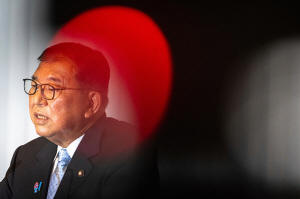Japan's Ishiba says he'll stay in office to tackle inflation and US
tariffs despite election loss
[July 21, 2025] By
MARI YAMAGUCHI
TOKYO (AP) — Japanese Prime Minister Shigeru Ishiba said Monday he will
stay in office to tackle challenges such as rising prices and high U.S.
tariffs after a weekend election defeat left his coalition with a
minority in both parliamentary chambers and triggered calls for his
resignation.
Ishiba’s ruling Liberal Democratic Party and its junior coalition
partner Komeito were short three seats to maintain a majority in the
248-seat upper house in Sunday’s vote. Though the LDP is still the
leading party, its ruling coalition is now a minority in both houses of
the Diet, or parliament, which makes it difficult for the coalition to
pass any legislation.
The loss of a majority in Sunday's election does not immediately lead to
a change of government because the upper house lacks power to file a
no-confidence motion against a leader. With opposition too fractured to
form a united front powerful enough to topple the ruling coalition,
Ishiba is under more pressure to step down from ultraconservative rivals
in his own party.
Ishiba said he takes the result seriously but that his priority is to
avoid creating a political vacuum and to tackle impending challenges,
including the Aug. 1 deadline for a tariff deal with the U.S.
“While I painfully feel my serious responsibility over the election
results, I believe I must also fulfill my responsibility I bear for the
country and the people so as not to cause politics to stall or go
adrift,” Ishiba said. “Challenges such as global situation and natural
disaster won't wait for a better political situation."

His chief tariff negotiator, Economic Minister Ryosei Akazawa, is
heading to Washington for his eighth round of talks. The prime minister
hopes to reach a mutually beneficial deal and meet with U.S. President
Donald Trump “as soon as possible," he said.
Sunday’s vote comes after Ishiba’s coalition lost a majority in the
October lower house election, stung by past corruption scandals, and his
unpopular government has since been forced into making concessions to
the opposition to get legislation through parliament. It has been unable
to quickly deliver effective measures to mitigate rising prices,
including Japan’s traditional staple of rice, and dwindling wages.
Trump has added to the pressure, complaining about a lack of progress in
trade negotiations and the lack of sales of U.S. autos and
American-grown rice to Japan despite a shortfall in domestic stocks of
the grain. A 25% tariff due to take effect Aug. 1 has been another blow
for Ishiba.
At a news conference Monday, Ishiba said his LDP and the Komeito have
agreed to stick with their coalition while seeking further cooperation
from opposition parties.
[to top of second column] |

Japan's Prime Minister Shigeru Ishiba attends a press conference at
the headquarters of the Liberal Democratic Party (LDP) in Tokyo
Monday, July 21, 2025 after the prime minister's ruling coalition
failed to secure a majority in the upper house in a parliamentary
election. (Philip Fong/Pool Photo via AP)
 Ishiba resisted calls for his
resignation and did not say how much longer he planned to stay on.
He is sticking around for the country and the people, not for
self-interest, “to put the pressing issues on a path to a solution,"
he said.
Voters frustrated with price increases exceeding
the pace of wage hikes, especially younger people who have long felt
ignored by the ruling government's focus on senior voters, rapidly
turned to emerging conservative and right-wing populist parties.
Established liberal to centrist parties, including the main
opposition Constitutional Democratic Party of Japan, gained little
ground.
The Democratic Party for the People quadrupled its seats by
campaigning for higher take-home pay. The right-wing Sanseito,
running on a “Japanese First” platform that puts tougher regulations
on foreigners and brakes on gender and sexual diversity, surged to
number three in the opposition.
The LDP has lost support due to the people's discontent over the
party's measures for rising prices, foreign residents and other
reasons and that he will “quickly analyze the results and learn the
lesson," Ishiba said.
None of the opposition parties said they want to form a full-fledged
alliance with the governing coalition but are open to cooperating on
policy. CDPJ leader Yoshihiko Noda told broadcaster NHK that his
priority is to form an alliance among the opposition.
“Public opinion clearly said ‘no’ to the Ishiba government,” Noda
said.
Sanseito leader Sohei Kamiya told NHK late Sunday he is open to
cooperating with the ruling bloc on conservative policies. While he
said his party did better than expected, he would wait to gain more
seats in the other house in the next election and attempt to form a
multi-party coalition like in Europe.
The Sanseito party’s stance encouraged the spread of xenophobic
rhetoric in the campaign and on social media, while also attracting
people who are strugging with economic woes and looking for targets
to vent their discontent and anxiety, experts say. The language
triggered protests from rights activists and alarmed foreign
residents.
All contents © copyright 2025 Associated Press. All rights reserved |